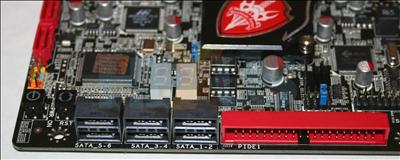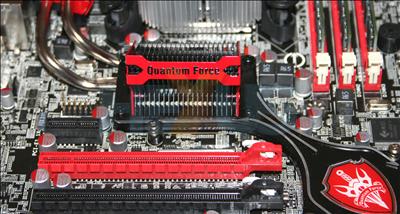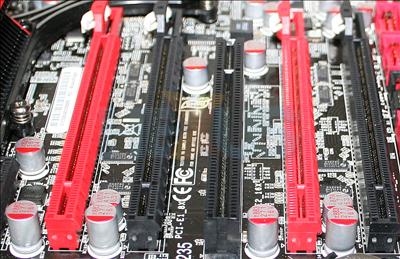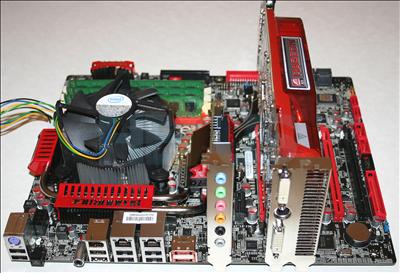The tour continues
Moving on down, Foxconn adds in PATA support by way of a JMicron controller. We're kind of surprised that Intel jumped ship and moved its chipsets away from native PATA support, knowing how many devices still use the interface.
Six rotated SATA2 ports are standard fare, and the debug LED screen, which goes through a sequence at POST, is obligatory on this kind of board, we feel.
We're fans of the power and reset buttons which have a nice glow when the board's operational.
Serial-attached SCSI (SAS) has been endemic in the server workstation market a while now, so it's good to see it make an appearance on an enthusiast-class board, run via a Marvell controller that sits above. SATA drives can be plugged into the SAS ports but not vice-versa.
Whilst a cool feature on the box, we reckon that the burgeoning SSD market will make SAS relatively moot within two years, but if you're a workstation/server customer looking for a (relatively) inexpensive board to mix-and-match SAS and SATA, Foxconn does provide a solution, albeit a RAM-limited one.
Expansion-wise, a single PCIe x1 slot is positioned right below where the add-in soundcard would be located; you'll see how just a few pictures on.
The Bloodrage ships with four PCIe Gen2.0 x16 (mechanical) slots that run at full-bandwidth x16 when one or two cards are placed (in the red slots), but are knocked down to four x8 when run in four-card mode, or a choice of x16, x16, x4 or x8, x8, x8 in three-card setups.
We'd like to have seen the solitary PCIc slot moved down to the bottom of the board where you could have added a component without compromising the slot from a graphics card shipped with a double-width cooler.
Here's the IO section with a Radeon HD 4870 and the supplied and previously-mentioned Creative Sonar X-Fi card in situ. The card supports 8-channel output and lossless transfer of high-definition audio from, say, Blu-ray discs.
The outputs include coaxial S/PDIF, dual Gigabit LAN (including teaming), dual eSATA, and six USB2.0, together with a solitary FireWire400 port. Right next to the leftmost USB ports is the rear-mounted clear-CMOS button - useful when the board's in a case and not on a workbench.
Summary
We like the layout of the Foxconn Bloodrage insofar as it packs significant technology - SAS, four-card graphics, extensive cooling, power/reset buttons, changeable IOH heatsink, and Creative Sonar - but the provision of only three DIMM slots is a compromise too far.














